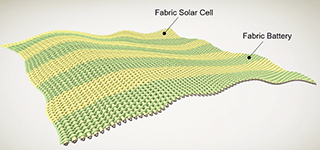
Bioengineers at the UCLA Samueli School of Engineering and their colleagues have developed and successfully demonstrated a wearable fabric that can harvest and store energy from the sun.
In a recent study published by the journal Matter, the advance shows a path to developing lightweight, smart clothing and wearable tech gear outfitted with unobtrusive bioelectronics sensors that people can use to monitor their health.
“Our fabric is a wearable solar cell and a rechargeable fabric battery all in one,” said Jun Chen, an assistant professor of bioengineering at UCLA Samueli and the corresponding senior author of the study. “There’s been a lot of early progress in wearable bioelectronics that are made from textiles that can flex and fold just like clothes. However, these sensors and electronics also need a source of energy to power them.
“What makes our fabric unique is that it also stores the energy, rather than simply harvesting it,” Chen said. “It could provide a sustainable and stable energy solution to wearable bioelectronics for personalized health care, such as measuring one’s heart rate and blood pressure.”
 The texture of the fabric is similar to that of a cotton t-shirt, and it can flex and fold over itself many times. The fabric is made of soft polymer fibers, coated with a thin layer of zinc and manganese dioxide that helps store the harvested energy from sunlight.
The texture of the fabric is similar to that of a cotton t-shirt, and it can flex and fold over itself many times. The fabric is made of soft polymer fibers, coated with a thin layer of zinc and manganese dioxide that helps store the harvested energy from sunlight.
Woven with inexpensive cotton yarns in a relatively simple manufacturing process, the fabric can store and maintain most energy up to 60 days. In addition to its functional capabilities, the colors and patterns of the fabric can also be customized, making it fashionable to wear.
The researchers used a 1-foot-square section of the fabric for the experiment. After 10 minutes in direct sunlight, the fabric stored about 150 joules of electric energy. That’s enough to keep a 60-watt light bulb on for 2 1/2 minutes, Chen said, noting that energy output will be proportional to the fabric area.
Other senior authors of the paper were Yi Nie from the Chinese Academy of Sciences, Beijing, and Xing Fan of Chongqing University, China.
Chen leads the Wearable Bioelectronics Research Group at UCLA. His lab focuses on nanotechnology and bioelectronics for energy, sensing and therapy applications in the form of smart textiles, wearables and body area networks. His particular focus is on developing smart textiles for personalized health-care applications.
